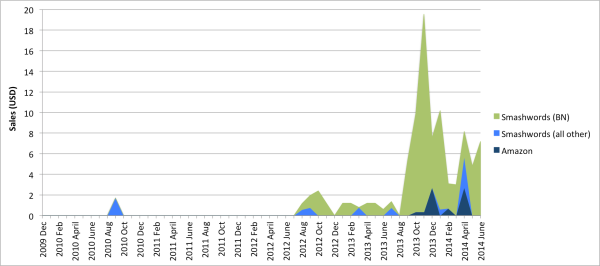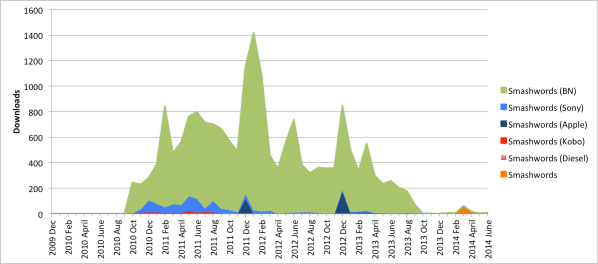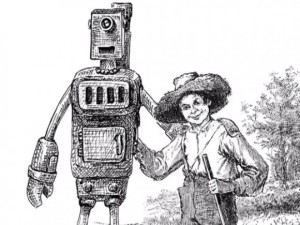Hey, all. Just wanted to let you know that my entire listing of books is 50% off on Smashwords for the month of July.
Tag Archives: books
What does a self-published career look like?
Inspired by Jim C. Hines’s openness about his own writing income and Hugh Howey’s analysis of Amazon’s sales figures, I decided to do some analysis of my own books’ sales data. I got these data from Amazon’s Kindle Direct Program and Smashwords, a site that distributes e-books to just about every bookselling site that’s not Amazon. Both programs offer authors a wealth of statistics about how their books are doing.
I got into this game at the end of 2009. I aggregated all my data collected since then into the following two charts. One shows book sales per month and the other shows downloads of free books per month.
The first thing you’ll notice is that I’m not making a princely amount of money. That shouldn’t come as much of a surprise. The next thing you’ll notice is that my books do way better on Barnes and Noble than anywhere else. This is a surprise to me, and while I don’t know exactly what’s going on, I have a few ideas.
I’ll walk you through some of the features of the figures. First of all, what happened in September of 2010? Well, I published my second novel, The Confederacy of Heaven. At the time, both The Confederacy of Heaven and Grizelda were free. (Grizelda was briefly $2.99 and I managed to sell one, which is why there’s a blip in the sales figure.) Why did I suddenly get a bunch of free downloads of both books once The Confederacy of Heaven went up? One idea I’ve got is that The Confederacy of Heaven was a hit in B&N’s free book category and pulled Grizelda up with it, all while I suspected nothing. Or maybe I signed up for Barnes and Noble distribution that month, or Smashwords added more distribution channels that month.
What happened in September of 2013? The free downloads drop off there and the sales spike up. For this one, I know what’s going on. In September 2013 I signed up with the Amazon Kindle program and switched my books from free to $3.99. It seems to be working well, but my B&N sales might be declining, just like the free downloads generally have declined since June 2011.
A couple other notes on the figure: Apple’s download data look pretty spiky because for a couple of years they would report all their downloads to Smashwords once a year in December. They started reporting once a month in 2013. My free downloads figures for Smashwords itself are underestimated because Smashwords only tells me when somebody redeems a 100% off coupon for one of my books. They don’t store data on other kinds of downloads for more than 90 days. I generally get 2 or 3 downloads of my free short stories per day.
You can see that little orange bump there when people redeemed coupons from my Kickstarter campaign.
So why do my books sell so much better on Barnes and Noble than anywhere else? I think there’s a couple of reasons. Barnes and Noble is bigger than any other channel except Amazon. And I had two novels distributed through Barnes and Noble free for a few years. This gave the books a chance to build up a stock of book reviews that convinced people to buy later on. I don’t have any free download data for Amazon because Amazon will only let you give away your book for two weeks per year, only if you agree to publish exclusively with them. But that’s a gripe for another day.
You can’t tell from these figures, but why does The Confederacy of Heaven consistently sell better than anything else, on every channel? I think it’s better than Grizelda but worse than Cannon Fodder, and it definitely has the worst cover art. But I sure appreciate the attention.
What do you guys think? Would you like to see another Confederacy of Heaven giveaway? Better cover art? Have you got any sales stats on your blog?
Oyster and Scribd
There’s two new developments in the book industry that are making me salivate, both as a reader and a writer. They’re called Oyster and Scribd, and they’re both recently-opened startups that promise to let you subscribe to an ebook service, a la Netflix.
Here’s how they work. You pay a monthly subscription fee ($9.95 a month for Oyster, $8.99 for Scribd) to get in. Once you’re in, you have access to the service’s entire database of ebooks. You can read as much as you want. So why doesn’t somebody sign up for one month, download a few hundred books, and run? You can only read the books while you’re a paid subscriber. Once you let your subscription lapse, the books disappear.
Why I’m excited as a reader
Both services are still hammering out deals with the major publishers, but if they do this right, their databases will have all the books. All the books. Right now, I agonize over book purchases because it’s a $10 investment, I have to give it shelf space, and I’m not at all confident I’m even going to like it. But if I could pay to have access to all the books, I’d start trying all sorts of new things I didn’t even know I liked.
Why I’m not going to sign up quite yet
I’m not a voracious enough reader of new stuff for this service to make financial sense to me, personally. I’m still a library and Project Gutenberg fiend. But there’s enough people out there who want the latest Jodi Picoult now that I think the system is going to work.
Why I’m excited as a writer
Did I mention that you get to read all the books?
So, about those aforementioned voracious readers. These services are going to be like the buffet to them. You pay once to get in, and then what? Try everything. I don’t know about Scribd’s terms yet, but for Oyster, every time you read more than 10% of a book, the author gets paid.
This is a great deal for obscure books (like, erm, me, a very obscure fantasy writer). I wouldn’t be willing to pay $3.99 for a self-published or $9.99 for a traditionally-published book I know nothing about. But if it’s free once you’re in, people will be willing to try new things.
This will be a good thing for writers if Scribd and Oyster wind up paying writers and publishers a fair price for their work. We’ll have to wait and see how that works out, but I’m hopeful.
The Adventures of Huckleberry Finn, Robotic Edition
You know how school boards sometimes get up in arms about the use of the n-word in Huckleberry Finn? Here’s a modest proposal.
Consequences of the Printing Press
Something to keep in mind when people complain about all the YouTube poop out there:
“One of the great diseases of this age is the multitude of books that doth so overcharge the world that it is not able to digest the abundance of idle matter that is every day hatched and brought into the world.”
Barnaby Rich, ~1850
Hand-Bound Silmarillion
So I had this friend in college who wanted to be a bookbinder. She’d taken a class on the History of Print (you can do that at Carleton), and immediately she was hooked. She started doing all the bookbinding she could. I remember Heather bringing her creations back to Science Fiction House to show all of us.
You can’t make a living as a bookbinder, you might say. Not in this age of TV and videogames and Kindle.
Well, it’s been a couple of years since we both graduated, and this is what’s happened:
Heather’s at the North Bennet Street School following her dream. She’s learning how to conserve books and make them into works of art. And she just made a hand-bound copy of the Silmarillion with a title printed in Tengwar.
See more here: http://bookwyrmbound.com/
They Finally Put a Date on Abarat 3
New Books at the Benton Library
Hey, all! We got a slew of new donations over the winter break, including:
- The Dresden Files books 1, 2, 3, 5, and 9. For those who are not familiar with these, these books are the inspiration for the TV show The Dresden Files.
- Atlas Shrugged by Ayn Rand
- Inkheart by Cornelia Funke
- Marlfox, Outcast of Redwall, Pearls of Lutra, and The Long Patrol, all Redwall books.
- Shadow of the Hegemon, by Orson Scott Card
And many others. Come check us out! As always, we’re on the corner of Second and Winona.





